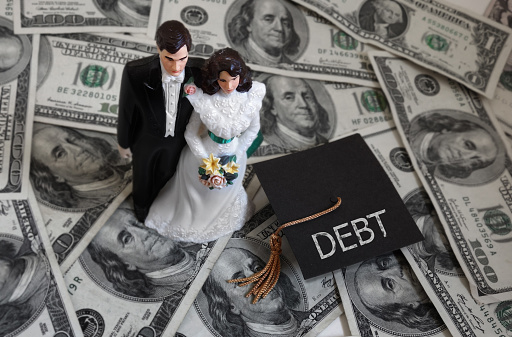Because Texas is a community property state, debt acquired during marriage is generally considered to belong equally to both spouses. This is true no matter who acquires the debt. Unfortunately, the outcome is that you could become responsible for your ex-husband or ex-wife’s debts.
A divorce settlement does not necessarily protect you from being forced to pay the bills as a recent CNN article pointed out. You need to understand the rules for shared responsibility for debts in Texas and you need to take steps to protect yourself. A divorce lawyer can assist you during divorce settlement negotiations and when your marriage is dissolved.
Who is Responsible for Debts in a Texas Divorce?
When you end your marriage, your divorce settlement decree should indicate who has to pay what debts. This decree is between you and your spouse only- your creditor is not a party to your divorce agreement.
Many people believe that if a divorce settlement says their spouse is responsible for paying debts, creditors have to honor that agreement. This is simply untrue. While the court will enforce the order and try to make your spouse pay, the creditor does not care about your divorce agreement.
If both you and your spouse incurred debt together or the money was borrowed jointly during the course of the marriage, then the creditor considers both spouses responsible for repayment. This does not change just because you and your spouse agree on who should pay.
If your spouse stops paying, then the creditor may try to get you to come up with the money. Your credit could be damaged and the creditor could pursue enforcement actions like going to court, getting a judgment against you, placing a lien on your property or garnishing your wages.
If your spouse stops living up to the terms of your divorce settlement, you can try to go to court and get your spouse to pay the debts as promised. However, your credit may already be damaged and if your spouse does not have the money then there are few options. Even if the spouse who is responsible for paying the debt officially goes bankrupt, the creditor could still try to collect from you. You’ll have to choose between ruining your credit by not paying, filing bankruptcy to get rid of your spouse’s debt, or simply paying the bills regardless of the fact your divorce agreement says they are not your responsibility.
When your ex-spouse dies, debt also becomes an issue since obviously your former husband or wife is not able to pay. The creditor could try to collect from the estate or could come after you for the money.
Protecting yourself from debt problems is difficult, but one option may be to pay off the debts with marital assets or to have your ex-spouse refinance debts into his or her name. Your attorney can advise you on the best way to proceed in order to reduce the chance of someday becoming responsible for your spouse’s debt.
Contact Bertolino LLP at 512-717-5432 or visit https://www.belolaw.com to schedule a consultation with a divorce lawyer today.
Call or text (512) 476-5757 or complete a Case Evaluation form





